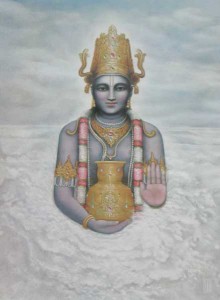 Disease begins when we forget our own true Self or nature. When we forget our true nature as spirit, we understand ourselves only as body and mind, and become wrapped up in the nature of the physical world and all of the dramas and stories associated with it.
Disease begins when we forget our own true Self or nature. When we forget our true nature as spirit, we understand ourselves only as body and mind, and become wrapped up in the nature of the physical world and all of the dramas and stories associated with it.
This result of these disturbances in the mind is called “vrittis” which disrupt the mental tranquility which lead to emotional disturbances. These as a result leads to physical diseases. Forgetting our true nature as spirit is the primordial cause of disease.
The Main Goal of Ayurveda?
The highest goal of Ayurveda is to maximize the body and mind’s potential to heal itself. Thus then the goal of Ayurveda has always been and always will be to keep us healthy in mind and body, while we pursue our more important spiritual goals.
In order to effectively heal our body and mind, we need to understand the 3 causes of disease. Here is an outline of them in their relation to Ayurveda.
1. Misuse of the senses. Misusing the senses involves over indulging in things that are detrimental to our health. For example, through the sense of taste we often over eat in foods that taste good – such as sweet and salty foods
Also when we take into our body that which does not match our Ayurvedic constitution, it is considered to be misusing the senses.
By understanding the role of the senses, Ayurveda utilizes the five sensory therapies in order to bring healing. The following should be used that are in conjunction with your dosha type.
• Taste therapy in the form of food, diet and herbs
• Touch therapy in the form of massage, specifically Ayurvedic massage
• Visual therapy in the form of color
• Sound therapy in the form of mantras
• Smell therapy in the form of aromatherapy
2. Failure of the intellect (Prajnaparadha). The failure of the intellect is when we act against our greater knowledge and wisdom. However, when we listen deeply within ourselves, we find ways to act that bring us toward more health and peace of mind. Our intellect is connected to both our senses and our higher Self.
While our senses can lead us astray, our soul leads us to balance and harmony. Ayurveda utilizes Yoga to train the intellect to listen deeply and hear the whispers of our soul.
This connection to spirit fills us with spiritual energy and empowers us to overcome the temptations of the senses.
3. Time & Motion (parinama). While linear time is static, biological time is dynamic. The pace of biological time changes in response to motion.
The movement of time innately leads to aging, to which we are all subjected to through our cycles of births, lives and deaths. No one is excluded from this law.
It is important to understand that biological time increase more by how busy we are in the movement of the mind rather than physical motion.
When the mind is active, caught up in the future or the past, biological time speeds up. When the mind is focused and in the present, biological time slows down.
When the mind is perfectly still, as occurs in deep meditation or engaged in something that sustains our focus and attention, there is no passage of biological time.
Ayurveda utilizes specific routines to help us focus on the present moment. The single-pointed mind is fixed on the present and does not drift to the past or future.
